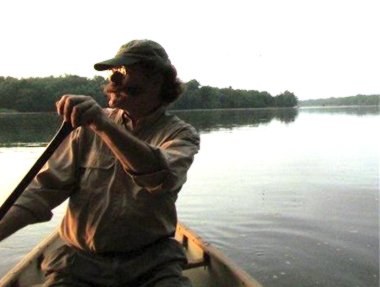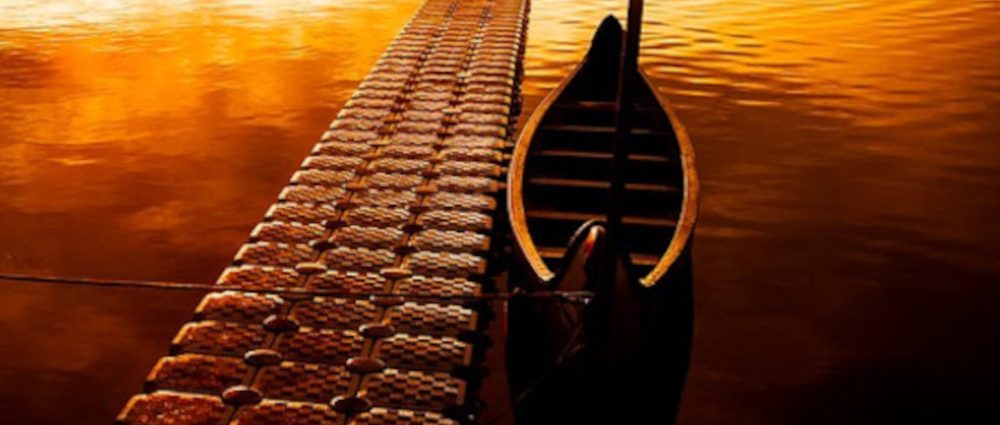Carl’s earliest memory of being in a canoe was on the Sugar River, near Brodhead Wisconsin sitting on the bottom of his family’s first canoe, just a little in front of his Dad, who was paddling stern. his brother was in front of the center thwart and Mom was paddling bow. The powerful part of that first memory of being in a canoe was the feel of the cold paddle drips hitting his back when his Dad would change sides. That being his first vivid memory of the paddling world, it might be a little surpriseing that he would like paddling at all. Fast forward about ten years and the family was camped at a village campground at the edge of Washburn WI, on Chequamegon Bay, near the Apostle Islands National Lakeshore on Lake Superior. It was a very calm evening on the bay and Carl asked his folks if he could take the canoe out by himself for a little paddle. With the cautions of “Stay close to shore.” and “Don’t go too far” Carl was off on his first canoe adventure solo. He knew that he really did not have the skills to be on Lake Superior in a 17′ aluminum canoe by himself, but he did stay close to shore and slowly and carefully explored the lake sculpted sandstone shoreline. Being careful to not touch the rock with an aluminum canoe and announce his lack of skills to the world. Carl slowly nosed the canoe into one of the shallow sea-caves and felt, for the first time, the connection and sense of oneness when the paddle,himself, the water, and the canoe flowed together. He liked the feel. A like that would, over the years of his life, grow into one of his many personal definitions of love.
Fast forward about ten years and the family was camped at a village campground at the edge of Washburn WI, on Chequamegon Bay, near the Apostle Islands National Lakeshore on Lake Superior. It was a very calm evening on the bay and Carl asked his folks if he could take the canoe out by himself for a little paddle. With the cautions of “Stay close to shore.” and “Don’t go too far” Carl was off on his first canoe adventure solo. He knew that he really did not have the skills to be on Lake Superior in a 17′ aluminum canoe by himself, but he did stay close to shore and slowly and carefully explored the lake sculpted sandstone shoreline. Being careful to not touch the rock with an aluminum canoe and announce his lack of skills to the world. Carl slowly nosed the canoe into one of the shallow sea-caves and felt, for the first time, the connection and sense of oneness when the paddle,himself, the water, and the canoe flowed together. He liked the feel. A like that would, over the years of his life, grow into one of his many personal definitions of love.
Fast forward a few more years, and the evening before the local canoe race on Sugar River held by Brodhead JC’s in 1969 Carl’s father, Elvin, asked him if he wanted to jump into the canoe race the next day to see if they could beat Carl’s brother Dan and Dave the neighbor kid in the race. Dan and Dave had been “practicing”. Elvin and Carl did beat Dan and Dave’s time on the river that day, but they were in a different class, the adult/child class, where they took 2nd place behind Ted Wheelock and one of this sons. They didn’t know it at the time, but Ted was a local canoeing ledgend around Richland Center, where the Pine River flows through some beautiful sandstone outcroppings and meanders past grazing holsteins.
The next year Carl decided to practice to try to win the Jr class in the local race. He teamed up with one of his freshman track team-mates and they practiced. Before the local race, they heard about another race on the Pecatonica River at Darlington. They entered and won, but only because another of Ted Wheelock’s sons and his partner tipped over during the race. At the finish line they were handed entry blanks to two more races, one on the Lower Wisconsin River, from Lone Rock to Muscoda and one on the Kickapoo River. They entered both races. On the Kickapoo, Carl and his partner encountered the river at flood stage. They got tangled up in a log jam and sunk that old aluminum canoe under that tree so solidly that it took eight men on a rope to pull the canoe out. At the finish line some folks that had a nicely designed fiberglass canoe let Carl take for a short ride. He liked it and the next year decided to write to the company that made it and ask where he could buy one. The company wrote back and said they did not have any dealers in his area, but if he wanted to buy four canoes, he could have a dealership. He did and with his parents help and encouragement, at the age of 16 opened Carl’s Paddlin’ in the family barn three miles from the Sugar River.
While still in high school Carl became the largest Sawyer Canoe dealer in a three state area and continued to race canoes and do some canoe camping. The year he grduated high school (1973) he won the Wisconsin Canoe Racing Association Jr State Championship and went on to win bronze at the United States Canoe Association National Marathon Championships.
In the fall of ’73 Carl moved to Florida, lived in a tent, paddled amongst alligators and wild pigs and saw a black panther drinking at the edge of the river near where he lived in the tent. He also learned to do eskimo rolls in his kayak from Steve Landick, who with Verlen Kruger would in 1980-83 do a 28000 mile exporation of the North American Continent by canoe, and learned to paddle Olympic Flatwater Kayak. While in Florida Carl also assisted leading a Boy Scout troop that had specialized in canoe and kayak racing.
In spring of 1974 he moved back to Brodhead, started buying his first house became the 1st WCRA Kayak Champion and went on to win bronze, silver and gold at the USCA nationals.
At the ’74 USCA national championships sprint events he won Gold in Solo Canoe, Silver in Tandem Canoe, and Bronze in Kayak.
In the mid ’70’s Carl worked as a janitor, worked for a heating contractor, and a farm equipment manufactuer, and ran a marathon, started a solar heating business.
In 1979 Carl sold his house, put his car in storage, packed up his backpack and spent the next nine months traveling around the world. He found that the places that were most appealing to him were where he could step into paddling culture. Places like Srinigar in Kashmir or the Backwaters of Kerala in south India.
In 1988 Carl certified as a Level Three Olympic Coach for flatwater sprint kayak. Two of the young men he was coaching and training with made it into the finals at the Olympic Trials. One of the two edged Carl out by 16/100ths of a second. He was paddling one of Carl’s kayaks that Carl had built. Carl told him that it was time to buy his own kayak and later that day, lent him the money to do it.
During the 1980’s Carl helped Rutabaga, a paddling shop in Madison, grow into one the largest retailers of paddlesports in the world. He taught the first seakayak class offered in Wisconsin.
In 1990 and 1991 Carl took charge of the paddlesports program for Erehwon Mountain Outfitters in Madison and Chicago areas.
In 1991 he took some time off to return to the “Backwaters “ of Kerala in, where the he witnessed a canoe race with some canoes that can hold 150 paddlers.
He started Carl’s Paddlin’ Canoe and Kayak Shop in Madison WI in 1992. It grew quickly and provided equipment, knowledge, and service to the paddling community, some as far away as Austrailia.
He started Mad City Paddlers Club at his kitchen table in 1993. The club now has over 350 members.
In 1994 he helped film Maker Dave Erickson with the Wisconsin Public Television Documentary “Gather like the waters” about the Lower Wisconsin Waterway. He built the camera and sound platform between two canoes and coordinated the paddlers to put it where it needed to be. He recruited paddlers and supplied canoes and kayaks for the production.
In 2010 Carl re-opened his shop in Lone Rock WI, a small river town along the Lower Wisconsin Waterway, where it has become part museum with some canoes and kayaks and paddles from parts of the last three centuries and as far away as the South Pacific and India.
Carl has spent the better part of his life involved in paddling and plans to spend the better part of what’s left of it finding ways to preserve what is left of the paddling cultures of the world. He has hopes of using the emerging technologies to help the people of the paddling cultures share their knowledge and experiences while preserving the environment and their culture.
He intends to keep learning as much as he can, especially about paddling.
2021-03-11

